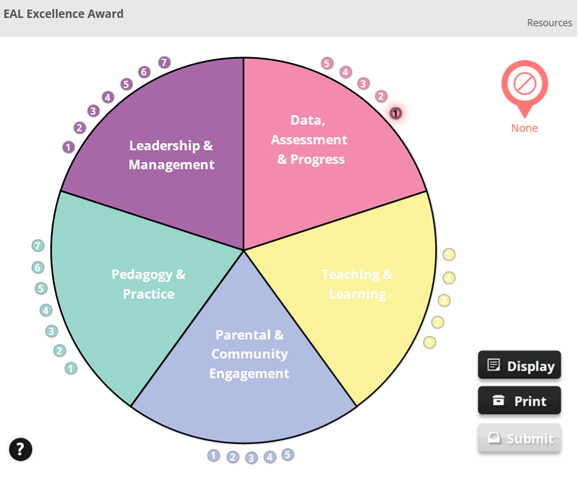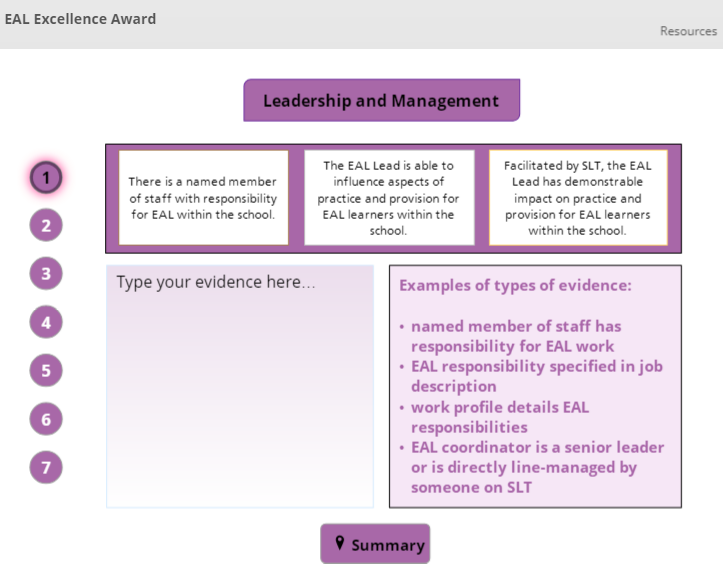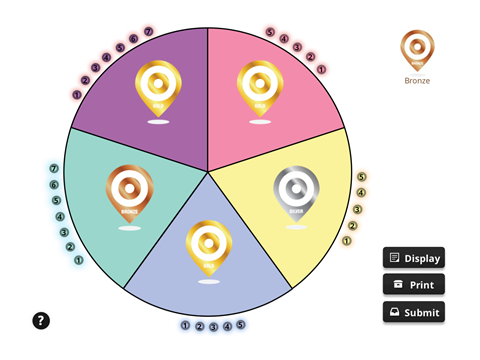Site blog
Designed by Hampshire EMTAS, the EAL Excellence Award is a comprehensive self-evaluation framework that helps schools monitor the impact of their provision for pupils learning English as an additional language (EAL) and address wider aspects of minority ethnic achievement. Covering five key areas - Leadership and Management, Pedagogy and Practice, Data, Assessment and Progress, Teaching and Learning and Parental and Community Engagement - the award originally featured three levels: Bronze, Silver and Gold.
However, as schools continued to use the framework to drive sustained improvement, a need emerged for a fourth level to recognise excellence consistently demonstrated at Gold across multiple validations. This blog explores the journey of the award through Merton Infant School’s own experience, offering insights into what sustained excellence looks like in practice.

Merton Infant School's EAL lead Mrs Relf and the Young Interpreters celebrate their Diamond Award
How did the Merton Infant School’s EAL journey start?
Merton Infant School’s journey began over a decade ago, when EAL was identified as a whole-school priority due to the increasing number of multilingual children joining the school. From the outset, the school worked closely with EMTAS, seeking advice on meeting the needs of multilingual learners, arranging whole-staff training and introducing the Young Interpreter Scheme.
In 2019, the school undertook its first award validation and achieved Bronze. Their EAL journey continued under the leadership of their EAL Co-ordinator, who ensured staff training remained current and provision was consistently maintained across the school. Acting on guidance from their initial validation, the school progressed to Gold in 2021. When they successfully renewed their Gold award in 2023, Headteacher Mrs James posed an important question: “What’s next for us?”
And so, the Diamond Award was born.
What is the EMTAS Diamond EAL Excellence Award and how do schools achieve it?
Working with Merton and other Hampshire schools that had reached similar milestones in their EAL journeys, EMTAS developed the Diamond level to acknowledge schools that not only maintain Gold standards but also act as centres of expertise, extending their impact into the wider community.
To qualify for Diamond, schools must achieve Gold across two consecutive validations and provide evidence of work in at least one of the following strands:
Community - engaging with families across the wider catchment
Collaboration - working in partnership with other schools
Contribution - supporting EMTAS initiatives and developments.
The Diamond Award was launched in 2024: Working beyond Gold – introducing the new EMTAS Diamond EAL Excellence Award.
How did Merton Infant School achieve Diamond?
In 2025, led by their new EAL Co-ordinator, Mrs Relf , Merton Infant School became the first school in Hampshire to achieve the Diamond EAL Excellence Award. To meet the Diamond criteria, Mrs Relf provided evidence in not one but two strands: Collaboration and Contribution. She mentored EAL Co-ordinators in other schools on their own EAL award journeys and worked with EMTAS to help shape the Diamond Award itself, as well as contributing to new content for the Young Interpreter Scheme.
The school also demonstrated that Gold standards had been consistently maintained since their previous validation. A key focus was consolidating the Leadership and Management strand by further embedding EAL into school policies and aligning it with the school’s core values: Motivation, Excellence, Respect, Teamwork, Opportunities and Never Give Up. The Pedagogy and Practice and Teaching and Learning strands remained strong, with EAL embraced by all staff. In addition, much work had focused on the Parental Engagement strand.
In response to parent voice gathered through EAL coffee events and annual questionnaires, families expressed a desire to play a more active role in sharing their cultures with the school. This led to the creation of Culture Day, with multilingual parents and staff invited to lead activities in school. The response was overwhelmingly positive, strengthening partnerships with families, many of whom have already volunteered to take part again next year.
Merton Infant School has been using a ‘Language of the Half Term’ approach since 2016. When Mrs Relf took on the role of EAL Co-ordinator, she refined and adapted the initiative to strengthen its impact. Children are now recognised as language experts and are invited to lead whole-school assemblies, allowing their peers to hear authentic pronunciation directly from one another. This peer-led approach promotes confidence, respect and inclusion.
Parents are actively involved, with families invited to check the accuracy and pronunciation of multilingual words, helping to ensure cultural and linguistic authenticity. Where possible, parents are also invited to attend launch assemblies to share their first-hand knowledge of the language. These contributions are warmly acknowledged and reinforce the school’s belief that families’ languages and cultures are valued and respected.
To support cognitive load, the amount of language taught has been carefully reduced, reflecting the principle that less is more. Previous languages are regularly revisited when new ones are introduced to support children’s long-term memory. As a result, by the end of the Summer term last year, pupils were able to confidently greet others in six different languages and identify where each language is spoken around the world.
To further reinforce the connection between spoken and written language, children are encouraged to write labels and captions in their own language so they can see their language represented in print. This was also set as a whole-school homework challenge, with many children taking part. Their work was proudly displayed across the school to celebrate linguistic knowledge and family involvement.
Following a suggestion from the EAL governor, key areas of the school environment are also labelled using the Language of the Half Term to enable children to see and engage with the language in meaningful contexts across the school. This inclusive approach is now part of everyday practice and extends into whole-school events such as productions, where children are encouraged to showcase the school’s linguistic diversity. When sharing messages such as Merry Christmas, Happy Diwali or thank you, children speak first in their own language. These small but meaningful moments send a powerful message of respect and belonging to children and families alike.
How did achieving Diamond impact the school as a whole?
Merton’s successful validation coincided with changes to the Ofsted framework, which now includes reference to early-stage learners of English as an additional language (page 20). In a twist of fate, Ofsted inspectors visited Merton Infant School on the very same day as their Diamond validation.
Inspectors were impressed by the school’s strong EAL leadership and parental engagement. During the inspection, Mrs Relf met with the inspector and spoke passionately about the school’s commitment to its multilingual families, from the moment registration forms are completed through to families becoming a valued part of the Merton community. The school’s culture is built on the belief that if provision is right for SEND and EAL families, it is right for everyone. Creating a welcoming environment where children and families feel a strong sense of belonging and are supported to thrive is central to this ethos.
This was evidenced through systematic book monitoring, questionnaires, governor monitoring visits, curriculum monitoring reports and parent feedback. Most powerful of all, however, was the pupil voice. Inspectors commended the children’s passion and maturity as they spoke confidently about their school and their experiences within it.
In their November 2025 report, Ofsted inspectors wrote:
Being a pupil here is like belonging to a big family with relatives all around the world. Whenever pupils join, great care is taken to settle them into school life. New arrivals who speak English as an additional language (EAL) are admirably supported by ‘young interpreters’. The diversity of the school community and the many home languages spoken are widely celebrated.
[...]
An unwavering focus on fairness and opportunity permeates the school. Pupils who speak EAL have an exceptional start to their education. Explicit teaching of speaking and listening skills and what words mean are part of everyday practice from early years upwards. Carefully considered resources and going over learning before or revisiting it after lessons support EAL pupils’ understanding.
What does it mean to have achieved Diamond level?
Achieving Diamond level officially recognises Merton Infant School as a centre of EAL expertise. This status goes beyond internal excellence - it positions the school as a leader in supporting others.
In the Autumn term 2025, EMTAS called upon Mrs James and Mrs Relf to co-deliver an online network meeting focused on the changes to EAL in the new Ofsted framework. Practitioners from across Hampshire working in different phases learned from Merton’s experience of the updated framework and how they successfully embedded EAL into whole-school practice. Colleagues came away feeling inspired by Merton’s work including the ‘Language of the Half Term’ idea, which other schools have since started to adapt for their own settings.
Coming soon, schools embarking on their Young Interpreter journey across the UK (and beyond) will be able to hear from Mrs Relf’s perspective of running the scheme at Merton Infant School in brand new video material uploaded to our Moodle. Practitioners will also hear from Merton’s Young Interpreters themselves!
What’s next for Merton Infant School?
Both Mrs James and Mrs Relf have reflected that achieving the Diamond Award is not an end in itself. EAL remains a core principle woven through everyday practice, one that is embraced by the whole school community. Work is continuing to maintain high standards, keep up with current approaches such as the Talk Rich Teaching Toolkit and support colleagues across the Hampshire EAL network.
Looking ahead, the Merton team is extending its expertise to Merton Pre-school, where a bespoke version of the EAL Excellence Award will shape provision for multilingual children under four years of age. We look forward to hearing how EAL continues to develop in the Merton community.
With thanks to Mrs James, Mrs Relf, staff, parents and children at Merton Infant School.
The Hampshire EMTAS Specialist Teacher Advisors have been supporting schools to complete the EAL Excellence Award for over a year now. Many schools have successfully earned their Bronze and Silver awards and are already working hard to achieve the next level up. Working with schools to drive EAL practice and provision forward through the EAL Excellence Award has highlighted areas of support which the EMTAS Teacher team has been keen to address.
One particular aspect of EAL good practice which many schools have had to consider is the use of first language as a tool for learning. Whilst most could confidently say that pupils felt comfortable speaking their languages at school (a feature evidenced at Bronze level), EAL co-ordinators felt that pupils could be better encouraged to use their languages to access the curriculum in the classroom (a feature evidenced at Silver level). In response to this, the EMTAS Teachers have been working closely with their schools to introduce ideas and strategies to support this and they are now keen to share their work with the EAL community.
Discover our brand new materials which consist of a narrated animation (below) with supporting material you will find attached to this blog: a transcript, activities based around the animation and an aide-mémoire summarising key strategies. Our work is still ongoing with a brand new piece of EAL elearning currently under development – watch this space!
Visit the Hampshire EMTAS website
Subscribe to our Blog Digest (select EMTAS)
In their last blog article published in the summer term, the Hampshire EMTAS team concluded the academic year with a celebration of their schools’ successful completion of the EAL Excellence Award. Now feeling refreshed after the summer break, the team look forward to the year ahead.
EAL Excellence Award
Our work supporting schools to develop and embed best practice for their EAL learners through the EAL Excellence Award continues. Surgeries will be held to help colleagues get ready for Bronze level and many of this year’s network meetings will focus on aspects of the award which practitioners need to develop for the next level up. For example, many schools will want to work on planning for the use of first language as a tool for learning this year (more on this in a future blog). See the EMTAS website for more information about the Award and how you can introduce it in your school or setting.
GRT Excellence Award
Following the success of the EAL Excellence Award, we have developed a similar award to support schools who have Gypsy, Roma and/or Traveller pupils on roll. At present, we have eight schools piloting the GRT Excellence Award and working towards getting their accreditation. To find out more, please contact: claire.barker@hants.gov.uk
NALDIC Berkshire & Hampshire Regional Interest Group (RIG)
NALDIC is the National Association for Language Development in the Curriculum and has an EAL remit. Part of the work of NALDIC is to run Regional Interest Groups (RIGs) across the country. Many of you may have heard that Dr Naomi Flynn is giving up her role as convenor of the Berkshire and Hampshire RIG. Whilst we are sad as this means we will see less of Naomi, we are also excited that the responsibility will now be shared between Portsmouth EMAS, Dr Anna Tsakalaki at the University of Reading and ourselves at Hampshire EMTAS! We wish Naomi all the best in her new role of Events Chair for NALDIC and look forward to working with our new co-convenors.
Network meetings
EMTAS network meetings are a great opportunity to meet colleagues with an interest in EAL practice and provision, to share ideas and to access input and take part in discussions on a range of EAL-related issues. These termly meetings are free to Hampshire maintained schools; staff from academies or the independent sector are also welcome to attend for a small charge. To find dates and information about how to register for a network meeting near you, see the Training section of the EMTAS website.
EAL E-learning
Our EAL E-learning has been given a complete overhaul this year to bring it up to date. The modules will now play even better in the Chrome browser and are optimised for seamless delivery over mobile devices. Check out our latest module on the ‘Role of the EAL coordinator’ and look out for new modules being developed this year.
SEAL (Supporting English as an Additional Language)
Due to popular demand, this course is running again starting in October 2019. It is a training programme for support staff and EAL co-ordinators to help them build up their knowledge of EAL good practice and pedagogy and has a strong focus on practical strategies to support pupils with EAL within their school environment. The course covers best practice in the classroom, SEND or EAL?, assessment, working with parents of children with EAL and the latest digital technology and resources to support learning in the classroom. If you are interested in signing up for this course, please check details on our website.
NALDIC Conference
This year the NALDIC conference takes place at King’s College London on 16th November (easy walking access from Waterloo station). The conference title this year is ‘Inclusive practices in multilingual classrooms: assessing and supporting EAL and SEND learners in the mainstream’. The NALDIC conference always has a good variety of workshops to suit all tastes, stands from publishers/resource providers and is a great place to network with colleagues from all over the country.
As you can see there are plenty of opportunities to get involved with EAL this year. We look forward to seeing you at an event near you.
Last September we kicked off our second year of blogging with an article introducing our new EAL Excellence Award, a self-evaluation tool for schools created with a view to support practitioners in developing EAL practice and provision. As they are about to break for their Summer holiday the Hampshire EMTAS Specialist Teacher Advisors reflect on their work with schools using the EAL Excellence Award in their area.

Getting ready
The award was met with much enthusiasm after its
launch in our blog and during network meetings. Practitioners found it helpful
as a way of mapping out the areas where provision was already strong whilst
identifying areas for development. For example, many schools identified the
need to appoint and train an EAL Governor. They reflected on policies and the
importance of writing a stand-alone EAL policy. The self-evaluation tool also
highlighted staff training needs which we supported through bespoke sessions as
well as our e-learning. Feedback from schools indicated that they found
the self-evaluation criteria relevant and purposeful.
Some
schools have collated evidence into folders to make the validation visit as
smooth as possible. They have used each statement from the EXA as a divider and
then placed any appropriate evidence, such as lesson plans, copies of school
policies or photos of work, into each section. This
made the validation process relatively straightforward since all the evidence
could be found in one place. For one school, the portfolio of evidence was
a piece of work which particularly impressed the Ofsted inspectors.
The validation process
Validation visits were, in most cases, carried
out by a Specialist Teacher Advisor not previously connected with the
school in order to get a fresh take on practice and provision. It has also been great
being able to meet Young Interpreters in some schools and in one school there
was even the chance to meet with the school governor responsible for EAL. This was supplemented by tours to see displays and collections of
resources in the library or in classrooms. One tip for schools thinking
about gaining their own award might be to take pictures of anything ephemeral
like a classroom display and keep them in readiness.
What’s next?
Since the launch of these materials in September there
has been interest from colleagues beyond the bounds of Hampshire. Schools have
already purchased licenses to use the tool within their establishment and EAL
specialists have been trained as validators to work with schools in their
own locality. If you are interested in finding out more, please contact: Chris.Pim@hants.gov.uk.
More materials will be produced to support schools
with gaining their EAL Excellence Award in 2019-20. There will also be training
opportunities to support aspects of the framework which some schools have found
trickier e.g. using first language as a tool for learning. We will also work with our current bronze schools who might be thinking
about developing their practice and provision towards silver.
Building on the success of the EAL Excellence Award,
the EMTAS Traveller Team have introduced a Traveller Excellence
Award that is currently being piloted in eight schools all around
Hampshire. We hope to present our first award early in the Autumn
term. This award helps schools audit their provision for their Gypsy, Roma and Traveller communities and helps to ensure that all
staff are well informed about the different GRT cultures in their
setting. If you are interested in finding out more, please contact: Claire.Barker@hants.gov.uk.
Finally...
We congratulate the following schools for their hard
work in achieving their award:
Bronze
Cherbourg Primary School, Eastleigh
Cove School, Farnborough
Hiltingbury Infants, Eastleigh
Marlborough Infant School, Aldershot
Merton Infant School, Basingstoke
New Milton Infant School, New Milton
South Farnborough Infant School, Farnborough
St John the Baptist Primary School, Andover
The Wavell School, Farnborough
Weeke Primary, Winchester
Silver
Cherrywood Community Primary School, Farnborough
Harestock Primary, Winchester
Ranvilles Infant School, Fareham
St John the Baptist Primary School, Fareham
Wellington Community Primary School, Aldershot
Visit our website to find out more about the
EAL Excellence Award and contact the Specialist Teacher Advisor for
your area to book a visit:
Basingstoke & Deane: Astrid Dinneen, astrid.dinneen@hants.gov.uk
Eastleigh
and Test Valley: Jamie Earnshaw, jamie.earnshaw@hants.gov.uk
Fareham and Gosport: Chris Pim, chris.pim@hants.gov.uk
Hart, Rushmoor and East Hants: Claire Barker, Claire.Barker@hants.gov.uk
Havant and Waterlooville: Chris Pim, chris.pim@hants.gov.uk
Isle of Wight: Lynne Chinnery Lynne.Chinnery@hants.gov.uk
New Forest – Lisa Kalim, lisa.kalim@hants.gov.uk
Winchester: Sarah Coles, sarah.c.coles@hants.gov.uk
Hampshire EMTAS Consultant Sarah Coles discusses how you can make sure you’re heading in the right direction.
EAL is a broad topic that touches on many different aspects of school life. Because of this, staff in schools, EAL Co-ordinators in particular, are given to wonder how they might know whether or not practice and provision in their setting makes the grade. Others want to identify not just areas for improvement but also ideas as to how they might achieve these improvements. This is where the EAL Excellence Award comes in.
The EMTAS Specialist Teacher Advisor team devised the EAL Excellence Award as a way of enabling schools to evaluate both strategic and operational aspects of their EAL practice and provision. It is an online, interactive tool that covers 5 core strands:
- Leadership and Management
- Data, Assessment & Progress
- Pedagogy and Practice
- Teaching & Learning
Parental and Community Engagement.
On screen, it looks like this:

© Copyright Hampshire EMTAS 2018
Within each strand is a series of statements at Bronze, Silver and Gold levels. Progression is clarified as the statements are linear and there is help with the supporting evidence element in the form of a list of possible examples. Practitioners click on the statement they feel most closely reflects current practice in their school and type into a text box the evidence they have to support their judgement.
This is an example of statements at Bronze, Silver and Gold from the first focus within Leadership and Management, together with examples of where the evidence might be found to support the school’s judgement:

© Copyright Hampshire EMTAS 2018
Once all the statements within one strand have been completed, practitioners can see the overall awarding level for that area, Bronze, Silver or Gold. Once all 5 areas have been completed, they can see the complete picture for their school with the overall awarding level being the lowest of the 5 strands.

© Copyright Hampshire EMTAS 2018
For example the school above is asserting they are at Gold level for Leadership & Management, Data, Assessment & Progress and Parental & Community Engagement, Silver for Teaching & Learning and Bronze for Pedagogy and Practice. For this school, the overall awarding level would be Bronze. The outcome, presented pictorially, means the EAL lead can readily identify areas of strength and places where some developmental work might not go amiss. In the example above, they might choose to focus on Pedagogy and Practice through their EAL Development Plan for the year, using the Excellence Award tool to support them to develop this area. Thus the tool enables EAL Leads in schools to work in a focused way, achieving a balance of strategic and operational tasks within their role, thereby ensuring they make best use of the time they have available for their EAL work.
When the EAL Lead has completed all statements in all strands of the EAL Excellence Award, they can submit their work to EMTAS. A validation visit will be arranged and if successful, a Bronze, Silver or Gold certificate, valid for 2 years, will be awarded to the school to acknowledge the work they do for their EAL learners.
The EAL Excellence Award includes access to resources such as model EAL Policies, suggestions on where evidence might be found and links to sources of further information and guidance. It links with the EMTAS suite of e-learning modules too, which practitioners can dip into to improve their knowledge of EAL Pedagogy or to find out more about the role of the EAL Co-Ordinator.
To find out more about how to get hold of the EAL Excellence Award to use in your school, or to talk about how you can be trained as a Validator to use the tool in schools outside of Hampshire, please contact Sarah Coles, sarah.c.coles@hants.gov.uk.

